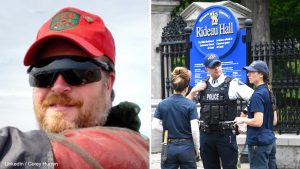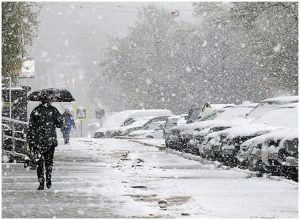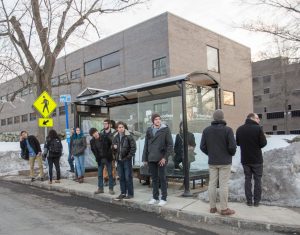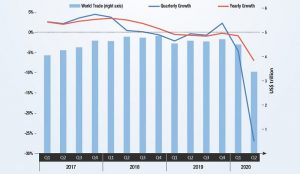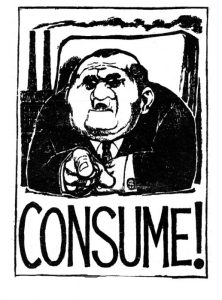I’ve written before about the sentences and sentiments that my students will insert into their papers, and this year’s marking was no exception when it came to complicated nonsense infused with the gift of meaning.
While writing about  Thomas King’s “Borders”—a story about an Indigenous mother and her son confronting the inherent arbitrariness and artificiality of the American and Canadian border—one of my students wrote the following sentences:
Thomas King’s “Borders”—a story about an Indigenous mother and her son confronting the inherent arbitrariness and artificiality of the American and Canadian border—one of my students wrote the following sentences:
In general, her goal was half accomplished, despite the fact that it was a frail and doubtful belief, with only faith and a tiny ambition, yet she kept her ancestors’ traditions to another generation. To demonstrate respect for our ancestors and roots, customs and traditions are something worth cherishing, preserving, and advancing over time.
Although they make up a bit of a word salad, it’s worth looking through the sentences in order to divine the student’s intent and then examine them for their actual utterances. Often misuse of diction and grammar drives the original meeting far beyond what the writer intends and a closer look can reveal more import than what plays on the surface.
Presumably the  reference to “her goal” refers to the mother’s wish to cross the national boundary, which was apparently a meagre or feeble wish but—the “yet” implies—she achieved this other parallel goal. The sentence implies that she “kept her ancestors’ traditions” alive by the crossing, or attempt to cross, although the story does not support such a notion. The student follows that vague statement with a general observation. Cultural knowledge is valuable and worth preserving. Because their ideas were so vaguely expressed, the student left much to the discernment of their reader. More interestingly—at least for our purposes—are the implications of the words themselves, in the context of the King story, and more generally in the context of cultural preservation.
reference to “her goal” refers to the mother’s wish to cross the national boundary, which was apparently a meagre or feeble wish but—the “yet” implies—she achieved this other parallel goal. The sentence implies that she “kept her ancestors’ traditions” alive by the crossing, or attempt to cross, although the story does not support such a notion. The student follows that vague statement with a general observation. Cultural knowledge is valuable and worth preserving. Because their ideas were so vaguely expressed, the student left much to the discernment of their reader. More interestingly—at least for our purposes—are the implications of the words themselves, in the context of the King story, and more generally in the context of cultural preservation.
The subordinate clause which begins their first sentence, “in general,” tells the reader that they are about to receive a kind of overview. That leaves few of their readers prepared for the outright error, “her goal was half accomplished,” which suggests that the mother’s goal—if it was meant to apply to the border crossing, is not successful. In fact, the sentence blithely declares it is “half accomplished,” which as anyone who has attempted to cross an international boundary knows, is impossible. There are no half measures when it comes to border crossings. As well, the mother in the story eventually crosses the border and by the end of the story has returned from  her trip and crosses the border again. Not only is this task more than “half accomplished,” but the mother holds both Canada and the United States hostage when they seek to deny her entry as though they have the right to tell an Indigenous woman whether she has the right to travel on her own land (She is Blackfoot and her unceded territory extends over the border).
her trip and crosses the border again. Not only is this task more than “half accomplished,” but the mother holds both Canada and the United States hostage when they seek to deny her entry as though they have the right to tell an Indigenous woman whether she has the right to travel on her own land (She is Blackfoot and her unceded territory extends over the border).
The “half accomplished” might be a simple misstep on the behalf of my student, or perhaps they didn’t read to the end of the story and therefore don’t realize the conflict in the middle of the text should not be read as its eventual denouement. The “in general” further confound this assessment, for it implies the student knows the story ending and yet remains unimpressed and willing to dissemble about the mother’s accomplishments.
The “it” in the next clause is presumable a reference to the “goal,” which, granted, remains obscure. If so, and the “it” refers to the mother’s wish to cross the border, then that has turned from a goal to a belief in the matter of a few words. I cannot imagine any way in which a goal could also be a belief, for they operate in entirely different ways upon the world. A goal remains undone, by definition, especially a “half accomplished” one, and indicates an action or a wish the mother is aiming toward. A belief is a fait accompli in that the mother already holds the belief and is not striving to achieve one as a goal. As well, the “belief” is “frail” somehow, as though it were not founded in fact, and “doubtful.” “Doubtful” is more uncertain in this context, for it is an adjective modifying “belief.” The mother does not have doubt in the belief, for all its frailty, but rather the belief itself holds some doubts. It could be a belief that few others would ascribe to, and therefore be doubtful in that sense, but without the reference to others who might essay the belief system in question, we are left to wonder if the belief itself has agency. The belief holds doubts, much as a person might, and there questions either its rightness—which for a belief would be its very existence—or the evidence which might draw others to believe it.
The description of the belief does not stop there, but instead if followed by the clause, “with only faith and a tiny ambition.” The “with” implies who the faith and ambition apply to although the comma before with allow two readings. In the first case the belief is the one with faith and ambition. Armed with this interpretation, we are left wondering if a belief can have faith, and perhaps even more troublingly, ambition. The comma introduces an ambiguity, for the clause about belief might be a subordinate clause and therefore ends with the comma. That would mean that the faith and ambition belong to the mother. She accomplishes half her goal of crossing the border with the assistance of “faith” and “ambition.” The student is not satisfied to leave the mother with such potent forces, however, so her faith is “only faith,” which diminishes it considerably, and her “ambition” is “tiny.” Rhetorically, this implies that the mother is working against overwhelming forces, although the modifying words belong to her, and tell nothing about the two governments she is flouting and merely reduces her ability to stand against them. That she is relying on merely faith and a miniscule ambition shows a kind of foolhardiness, not the resolution the mother in the story possesses.
The sentence leads inevitably toward the yet. Confounding the entire rest of the sentence, the mother rises above her tiny ambition, mere faith, doubtful belief, and frailty of her half accomplished goal to overturn that with a new topic. Although previously the sentence has not implied the argument in the least, the import of all the weakness and doubt is that the mother still possesses her traditions. Of course, the statement about her  traditions is not nearly as straightforward as that. Her continued possession of the traditions is confirmed by the word “kept,” and their traditional nature is implied by the modifying word “ancestors’,” but the sentiment goes aground when it tells what she is doing with them. Although the notion would be much clearer if the student used the preposition “for,” they do not. Thus we have a mother who is keeping her ancestors’ traditions “to another generation.” Does she plan to deliver them eventually? Is she waiting for a particular generation she believes is more worthy? Is she passing on the traditions and the sentence merely tangled the notion of keeping with handing them over? There is no easy answer to this question, and that becomes even clearer when we read the sentence as a whole. The mother is attempting to achieve a goal, holds some belief, and is preserving her peoples’ traditions for some reason which might involve subsequent generations.
traditions is not nearly as straightforward as that. Her continued possession of the traditions is confirmed by the word “kept,” and their traditional nature is implied by the modifying word “ancestors’,” but the sentiment goes aground when it tells what she is doing with them. Although the notion would be much clearer if the student used the preposition “for,” they do not. Thus we have a mother who is keeping her ancestors’ traditions “to another generation.” Does she plan to deliver them eventually? Is she waiting for a particular generation she believes is more worthy? Is she passing on the traditions and the sentence merely tangled the notion of keeping with handing them over? There is no easy answer to this question, and that becomes even clearer when we read the sentence as a whole. The mother is attempting to achieve a goal, holds some belief, and is preserving her peoples’ traditions for some reason which might involve subsequent generations.
The second sentence is the student’s chance to expand on their earlier argument and make it a more general statement about borders, weakness in the face of adversity, and traditional cultures. They take the opportunity to discard any concerns about the mother’s goals and how that might affect the reader or others, the frailty of her beliefs, her inconsequential ambitions, and instead focus on traditional knowledge. The sentence is tempting to read as a fragment. Because the initial “to” and the change of topic when it comes to traditions and customs, the reader expects an action a subject might be called upon to perform. In that case the implied clause would be missing from the end of the sentence. That might better inform the reader how respect for our ancestors might be accomplished, but that is not what the sentence is doing. Instead, we have to read it at face value, as a shift in thought partway through a prescription on how respect might be demonstrated.
Respect is applied to both our “ancestors” and “roots,” which presumably two different functions, but we are not asked to respect them, but rather merely “demonstrate” respect. That much easier call to arms is confounded by the ambiguity  of roots in this context. If “roots” is not a reference to the ancestors, then presumably it refers to the place, the village we are from, or some genetic division which the rest of the sentence does not make clear. If it merely indicates tautology, then that helps to explain the similar issue with “customs and traditions.” Their meaning is slightly different, just like ancestors is a much more precise word for roots, but such is the vagueness of the sentence that we cannot decide what those fine distinctions bring to the sentence.
of roots in this context. If “roots” is not a reference to the ancestors, then presumably it refers to the place, the village we are from, or some genetic division which the rest of the sentence does not make clear. If it merely indicates tautology, then that helps to explain the similar issue with “customs and traditions.” Their meaning is slightly different, just like ancestors is a much more precise word for roots, but such is the vagueness of the sentence that we cannot decide what those fine distinctions bring to the sentence.
The sentence becomes much more problematic when it considers what we should do with traditions and customs. The mother is presumably passing her traditions on to “another generation” but we are merely asked to “cherish” them. In fact, my student is not that bold. We are not asked to cherish, we are merely told they are worth cherishing, and whether or not we cherish is left entirely in our hands. Likewise we are entreated to preserve our traditions and customs. Such dictates, however mildly applied, make sense in the context of the mother in the story as well as in the broader context of our lives outside of fiction. Where the sentence begins to run agaisnt its argument is that we should also “advance” our customs and traditions. Somehow, the customs are not enough as they are, but need an upgrade.  We are given time to make that upgrade, for we can do it “over time,” but the notion that the customs need to be advanced is clear enough. That is the only respectful path, the sentence demands. We must do more than cherish and preserve. We have to ensure that subsequent generations receive better traditions that we did. The notion of traditions and customs becomes confused by this desire for improvement, in that we are not concerned as much about preserving, or even cherishing, if we are gutting the traditions for something better. How the respect for something can be achieved when part of it has been turned to destroying the object of that respect becomes the sentence’s central question, and unfortunately, the reader is left to their own devices when it comes to understanding what the student intended. The paragraph ends there, and the next paragraph takes on an entirely new argument.
We are given time to make that upgrade, for we can do it “over time,” but the notion that the customs need to be advanced is clear enough. That is the only respectful path, the sentence demands. We must do more than cherish and preserve. We have to ensure that subsequent generations receive better traditions that we did. The notion of traditions and customs becomes confused by this desire for improvement, in that we are not concerned as much about preserving, or even cherishing, if we are gutting the traditions for something better. How the respect for something can be achieved when part of it has been turned to destroying the object of that respect becomes the sentence’s central question, and unfortunately, the reader is left to their own devices when it comes to understanding what the student intended. The paragraph ends there, and the next paragraph takes on an entirely new argument.
If we step back from the initial sentence, as the “in general” asks that we do, we are left with a mother confronted by massive forces armed merely with her sense of morality and beliefs, who nonetheless takes the time to pass on her cultural ways of knowing to the next generation even while she is fighting the governments. We know as little about her legacy as we do her goal, but I think the sentence is correct that we can sympathize with her weakness and cheer for her persistence in the face of adversity, regardless of what she believes and what she is doing with her peoples’ traditions. By becoming lost in their own sentence, the student’s weak grasp of diction and referents, has nonetheless delivered the central message of the story. The mother’s wish to pass on her traditional knowledge, her willingness to stand against others to ensure that her culture continues, becomes her goal just as much as her desire to confront the colonial government over their arbitrary and illegal borders.
Their notion of cultural ways of knowing as a fluid set of traditions is also useful in the context of the oral tradition, and with that final sentence they capture the conundrum which is that the preservation of culture and traditions necessarily is based in how relevant they are to their audience. They do not claim we should reject the past customs, but rather that they are worthy of much more than cherishing and preserving. Cultural ways of knowing are dynamic, changing, and crucial to the culture from which they originate. To merely preserve them in an anthropologist textbook is to forget their relevance to the world today. Some of the traditions might need updating, my student argues, but they exist for more than the warehouse and respect is more than a demonstration. To truly honour our ancestors, we need to take what they have given and seek ways to apply that to our world.
My student likely knew little about what they were accomplishing by using the language in a fashion which stretched syntax and meaning, but they accomplished more than merely a series of incoherent and inaccurate statements, although they did that too. They put together notions that few others consider, and did so in a way that demanded their audience do the work of interpretation. Mistakes can add up to more than concise intention, and a close reading can reveal more than any one of us might intend to say.
 which heralded the entire family coming to visit, she took Silvio aside and asked him to send me away. “He’s not really family,” she complained. When Silvio asked what he was supposed to do with me, she recommended dropping me off at a hotel.
which heralded the entire family coming to visit, she took Silvio aside and asked him to send me away. “He’s not really family,” she complained. When Silvio asked what he was supposed to do with me, she recommended dropping me off at a hotel.
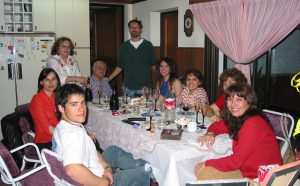 about the rudeness, and took us in for the two days the cousin was in town. Reportedly the cousin tried to talk to the father about the issue and begged to know where we were, but he merely said we were off partying and would come home eventually. The cloak and dagger was too much for her finally and she left, to return to a much reduced family Christmas. Once the patriarch removed his support, the rest of the family followed suit.
about the rudeness, and took us in for the two days the cousin was in town. Reportedly the cousin tried to talk to the father about the issue and begged to know where we were, but he merely said we were off partying and would come home eventually. The cloak and dagger was too much for her finally and she left, to return to a much reduced family Christmas. Once the patriarch removed his support, the rest of the family followed suit. hospitality was more profound than I thought. They apologized frequently, said that I was family, and that I was always welcome in their house.
hospitality was more profound than I thought. They apologized frequently, said that I was family, and that I was always welcome in their house.






























